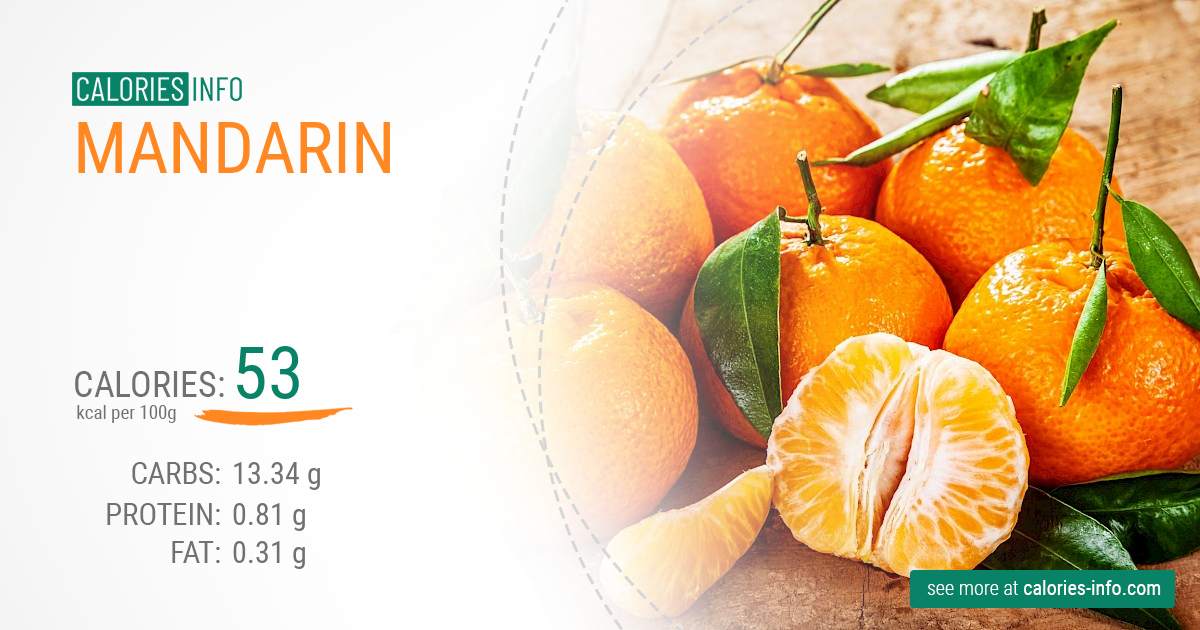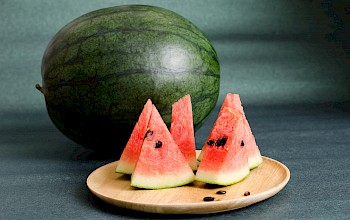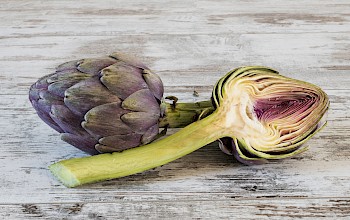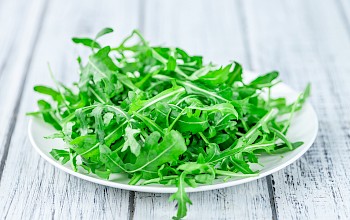Mandarin (Tangerine): Calories and Nutrition Analyse
How many calories in mandarin?
100g of tangerines have about 53 calories (kcal).
Calories per:
ounce
| one mandarin
| cup
| half cup
For instance, medium size mandarin (75 g) has about 40 calories.
It is about 2% of daily calories intake for adult person with medium weight and medium activity (for calculation we assumed 2400 kcal daily intake).

Scroll down for details and nutrition tables.
To visualize how much 40 kcal actually is, take in mind that calories amount from mandarin is similar to calories amount from ie.:
- 0.5 apple
- 0.5 glass of Coca Cola (220 ml glass)
- 2 cubes of sugar
Take a look at tables below to see details about mandarin nutrition.
See all nutrition data of mandarin on charts.
Calories And Nutrition in Medium Size Mandarin (75 G), 100g and Ounce
| per 100 g | per ounce | medium size mandarin (75 g) | |
|---|---|---|---|
| Calories | 53 | 15.03 | 39.8 |
| Carbs Total | 13.34 g | 3.78 g | 10 g |
| Dietary fiber | 1.8 g | 0.51 g | 1.4 g |
| Fat | 0.31 g | < 0.1 g | 0.2 g |
| Protein | 0.81 g | 0.23 g | 0.6 g |
| Water | 85.17 g | 24.15 g | 63.9 g |
mandarin - vitamins per 100g
- Vit A681 IU
- Vit B1 (Thiamine)0.058 mg
- Vit B2 (riboflavin)0.036 mg
- Vit B3 (Niacin)0.376 mg
- Vit B50.216 mg
- Vit B60.078 mg
- Vit B9 (Folic acid)0.016 mcg
- Vit C26.7 mg
- Vit E0.2 mg
Energy content of mandarin
- 90% CARBS
- 5% PROTEIN
- 5% FAT
mandarin - minerals per 100g
- Potassium166 mg
- Magnessium12 mg
- Calcium37 mg
- Sodium2 mg
- Iron0.15 mg
- Beta karoten101 mg
How many calories in 1, 2, 3 or 5 tangerines?
As I wrote before medium size mandarin (75 g) have 40 calories. It is easy to count that two tangerines have about 80 calories and three tangerines have about 120 calories. In table below you can also see calories amount for four and five tangerines.
- Medium size mandarin (75 g)40 kcal
- Cup of mandarin (196g)104 kcal
- Half cup of mandarin (98g)52 kcal
- Ounce (oz) of tangerines15 kcal
- Half of medium size mandarin20 kcal
- Small size mandarin (60g)32 kcal
- Big size mandarin (98g)52 kcal
- Two medium size tangerines80 kcal
- Three medium size tangerines120 kcal
- Four medium size tangerines160 kcal
- Five medium size tangerines200 kcal
Protein in mandarin
Tangerines have 0.81 g protein per 100g.
When you multiplay this value with weight of medium size mandarin (75 g) you can see that you will get about 0.6 g of protein.
Carbs in tangerines
Tangerines have 13.34 g carbohydrates per 100g.
In the same way as for protein we can calculate that medium size mandarin (75 g) has about 10 g of carbs.
Fat in tangerines
Tangerines have 0.31 g fat per 100g.
So it is easy to count that medium size mandarin (75 g) has about 0.2 g of fat.

medium size mandarin (75 g) has:
40kcalFor burning these calories you have to:Interesting charts - compare mandarin with other fruits
When you look at charts below you will see how mandarin looks like in comparsion to other products from its category. When you click on selected product you will se detailed comparsion.
Similar calories number have:
See also:
Read this:
- How many calories does pepper have?
- Calories in a half of bok choy
- Calories in whole bok choy
- Calories for one, two or more bok choy leaves
- How many carbs (carbohydrates) in calabash?
- How much fat in broccoli?
- How much protein in rapini?
- What is weight of Brussels sprouts?
- Butternut squash calories per ounce (oz)
- Cabbage calories per serving size




Add comment